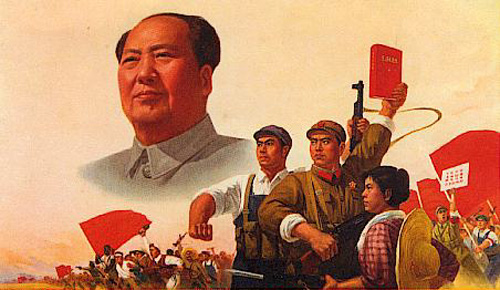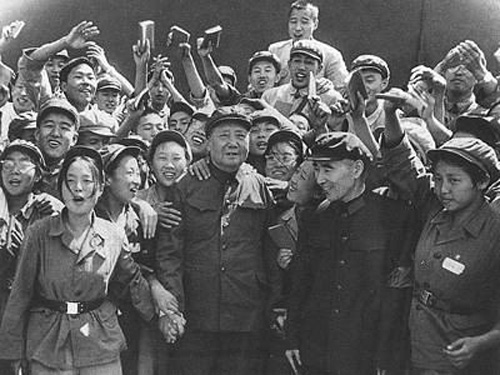Why and How the CPC Works in China
 0 Comment(s)
0 Comment(s) Print
Print E-mail
China.org.cn, October 27, 2011
E-mail
China.org.cn, October 27, 2011
Leaders sharing weal and woe with the masses
Another important reason why the CPC retained the people's support was that the CPC's head Mao Zedong and the other leaders stuck with the masses through thick and thin.
During the difficult period for the national economy the CPC Central Committee did not conceal the damage caused by the disaster, but told people of the difficult conditions in time to overcome them together. It took them only three or four years to overcome the enormous difficulties of economic recession. This would have been unimaginable without the prestige of the CPC and Mao Zedong among the people.
For example, due to financial difficulties at that time, the number of workers who had been recruited in the Great Leap Forward from the rural areas to the cities and their relatives had to be reduced in order to lighten the economic burden of the state in supply. From early 1961 to June 1963, a total of about 20 million workers and staff members and 26 million urban people were repositioned. Bearing in mind the overall interest, and understanding the national difficulties, vast numbers of workers, staff members and cadres understood the problem, and this work went very smoothly. As Premier Zhou Enlai said, the evacuation of so many people was equivalent to the moving of a medium-sized country from one place to another. In China, no other power could have accomplished this; only the CPC had the mass base to do so.
In November 1979, at the central meeting for party, government and military cadres at the vice-minister level and above, Deng Xiaoping also pointed out, "Looking back at 1958 and 1959, the Party made so many 'Left' mistakes that the national economy encountered great difficulties… It also sent 20 million workers and staff members to work at the grassroots level and closed down some enterprises. How could it do so at that time? How could the CPC adjust the national economy relatively smoothly then? It was because the Party was close to the masses, and the Party's prestige was relatively high among them. It explained the difficulties to the people, clarified the truth to the masses, and did a lot of work. The sending of 20 million people to work at grassroots level alone was not easy. It could not have been done if the Party and the government had not had very high prestige."
In August 1985, talking with Robert Mugabe, prime minister and president of the African National Union of Zimbabwe, Deng Xiaoping pointed out again that during the three difficult years from 1959 to 1961 the Party and Chairman Mao Zedong enjoyed very high prestige formed over a long history of struggle. They told the people of the difficult situation truthfully. The slogan of "Great Leap Forward" was no longer shouted, and more realistic policies, procedures and methods were adopted. In 1962 the country began to recover from a difficult situation, and in 1963 and 1964 the situation was relatively better.
During the difficult period for the national economy, people's lives were very difficult. Mao Zedong and other central leaders felt they should experience this in person, so they took the lead in tightening their belts to tide over the difficulties. On November 9, 1960 the CPC Central Committee gave an instruction on the issue of supplies in accordance with the special needs of senior cadres and intellectuals. The instruction demanded that with regard to regulations of supply in accordance with special needs, the scope be set smaller and the standard lower. The scope of consideration for supply of non-staple foodstuffs in accordance with such special needs should be determined more generously for non-Party patriotic figures and senior intellectuals and more strictly for cadres within the Party.
In order to facilitate the unity, education and transformation of non-Party personages, if they received a little more care in their daily lives, the masses would not have many differing opinions. If the scope of consideration for the Party members was defined too wide, or there were appropriate rules but the control was relaxed, allowing certain cadres to obtain additional supplies by abusing their powers beyond the limit of the rules or going "back door" without serious punishment, the consequences would be very serious. If cadres lived a special life and cut themselves off from the masses, the Party-masses relationship would be damaged, thus hampering the Party from leading the masses to overcome difficulties and tide over famine. In the long term, a corrosive effect on the thinking of cadres would be inevitable.
In the implementation of this regulation, the supply standards of the first category – for deputy chairmen, deputy prime ministers, vice-chairmen of the National Defense Commission, vice-chairmen of the Chinese People's Political Consultative Conference (CPPCC), president of the Supreme People's Court and chief procurator of the Supreme People's Procuratorate – were: half a kilogram of meat per day, three kilograms of eggs, one kilogram of sugar and two cartons of grade-A cigarettes per month for each household. The supply standards of the second category – for members in Beijing of the standing committees of the National People's Congress (NPC) and the CPPCC, ministers and deputy ministers, directors and deputy directors of various ministries and commissions of the State Council, vice-president of Supreme People's Court, deputy chief procurator of the Supreme People's Procuratorate, deputy secretary-generals of the NPC and CPPCC, chairmen and vice-chairmen of the non-communist parties and grade-one personnel among senior intellectuals in Beijing – were: two kilograms of meat, one kilograms of sugar, two cartons of grade-A cigarettes and one and half kilogram of eggs for each person every month. In case of inadequate source of eggs, fewer eggs would be supplied, and if there were no eggs, there would be no supply.
In order to set an example, Mao Zedong himself stopped eating his favorite braised pork. During the three difficult years Mao Zedong held three birthday celebrations. Judged from the recipes preserved, there was no liquor, no birthday cake, and not the slightest atmosphere of rejoicing and festivity was to be seen. December 26, 1962 was Mao Zedong's 69th birthday. He had his breakfast and a bowl of cereal in the evening, only. Over breakfast, Mao invited his staff to eat together with him: braised bamboo shoots with chilli sauce, fried shrimp, white sauce carp, wax gourd balls fried with chicken fat, and fried lettuce.
At the same time, Mao Zedong reduced his own salary from 600 yuan for level one cadres to 404.8 yuan per month for level-three cadres. This was not changed until his death in 1976. Led by the CPC Central Committee and Mao Zedong, on September 11, 1960 the leading Party groups of the State Planning Commission and Ministry of Labor submitted to the CPC Central Committee and Mao Zedong the "Report on the Issues of Current Arrangement of Labor and Wages of Workers and Staff Members," which put forward that, in accordance with the instructions of a recent meeting by the Secretariat of the Central Committee of the CPC, in order to further narrow the wage gap and facilitate closer relations between leaders and masses, they put forward the following suggestions regarding the reduction of existing wage standards for responsible state organ cadres of the Party: Wages at levels one, two and three would be reduced by 12 percent; level four by 10 percent; level five by 8 percent; level six by 6 percent; level seven by 4 percent; level eight by 2 percent; and levels nine to 17 by 1 percent. The wages of Party cadres in enterprises and institutions equivalent to level 17 of those of state organs should be similarly reduced. The wages of responsible Party cadres on military service were to be reduced accordingly. Wages for non-Party cadres would not be reduced.
On September 26, 1960 the CPC Central Committee disseminated the instructions of the leading Party groups of the State Planning Commission and Ministry of Labor, expressing the belief that the various measures proposed in the report were correct, hoping that implementation would be arranged immediately, and proposing that the wages of leading Party cadres should be gradually reduced within the next few years to narrow the gap between high and low wages, and to facilitate the task of leading the masses to work hard and build the nation industriously and frugally.
In November 1979 Deng Xiaoping pointed out specifically on this issue that before the Cultural Revolution the Party had striven to make the lives of senior officials a little closer to those of the cadres at the lower levels as well as the masses. They had reduced the wages for senior cadres three times, and clearly stipulated that wages for senior cadres should not be increased any further. Wages of cadres, workers and staff members should only be raised gradually on the basis of production development to improve the people's lives.
Throughout its history, Chinese society had developed a collective mentality, in which communities – from the smallest family to the country as a whole – shared weal and woe. If a family encountered difficulties, the couple and their relatives would resolve them jointly; if the country was in trouble, people with lofty ideals would offer all they had to help. The ancient Chinese historical work Intrigues of the Warring States: Strategies of Yan, tells how the Prince of Yan personally attended the weddings and funerals of every family, sharing happiness and misery with his people. Eventually, under his rule, Yan became prosperous and its people well-off, and he himself was widely esteemed.
The practice that the CPC and its leaders shared weal and woe with the people was the key to its winning public trust and support.





